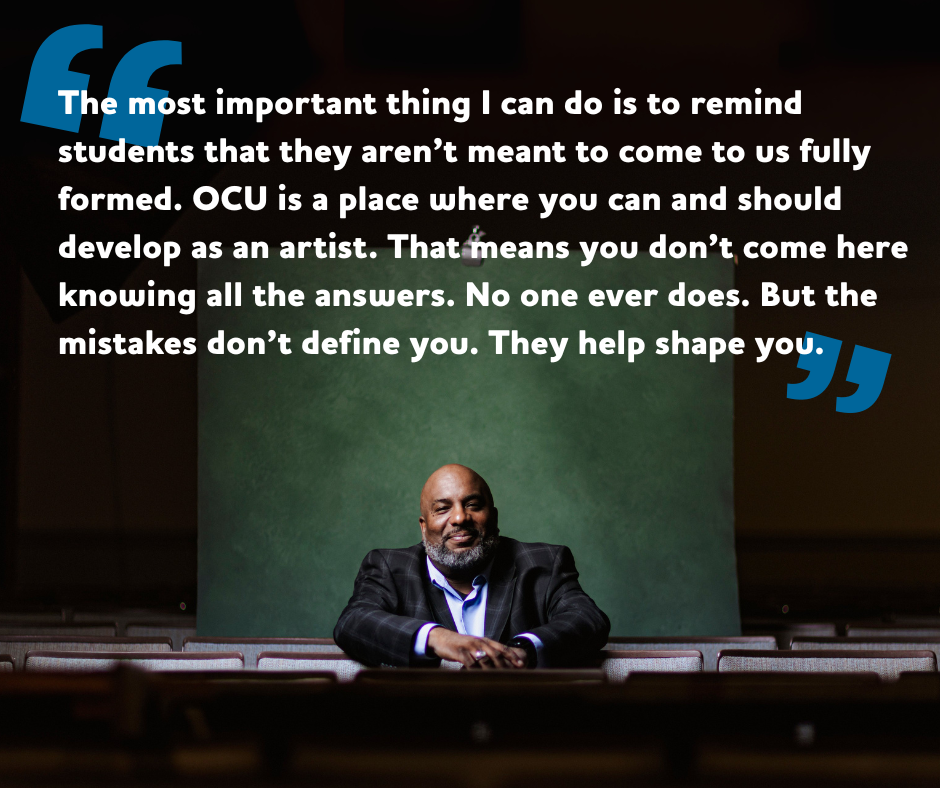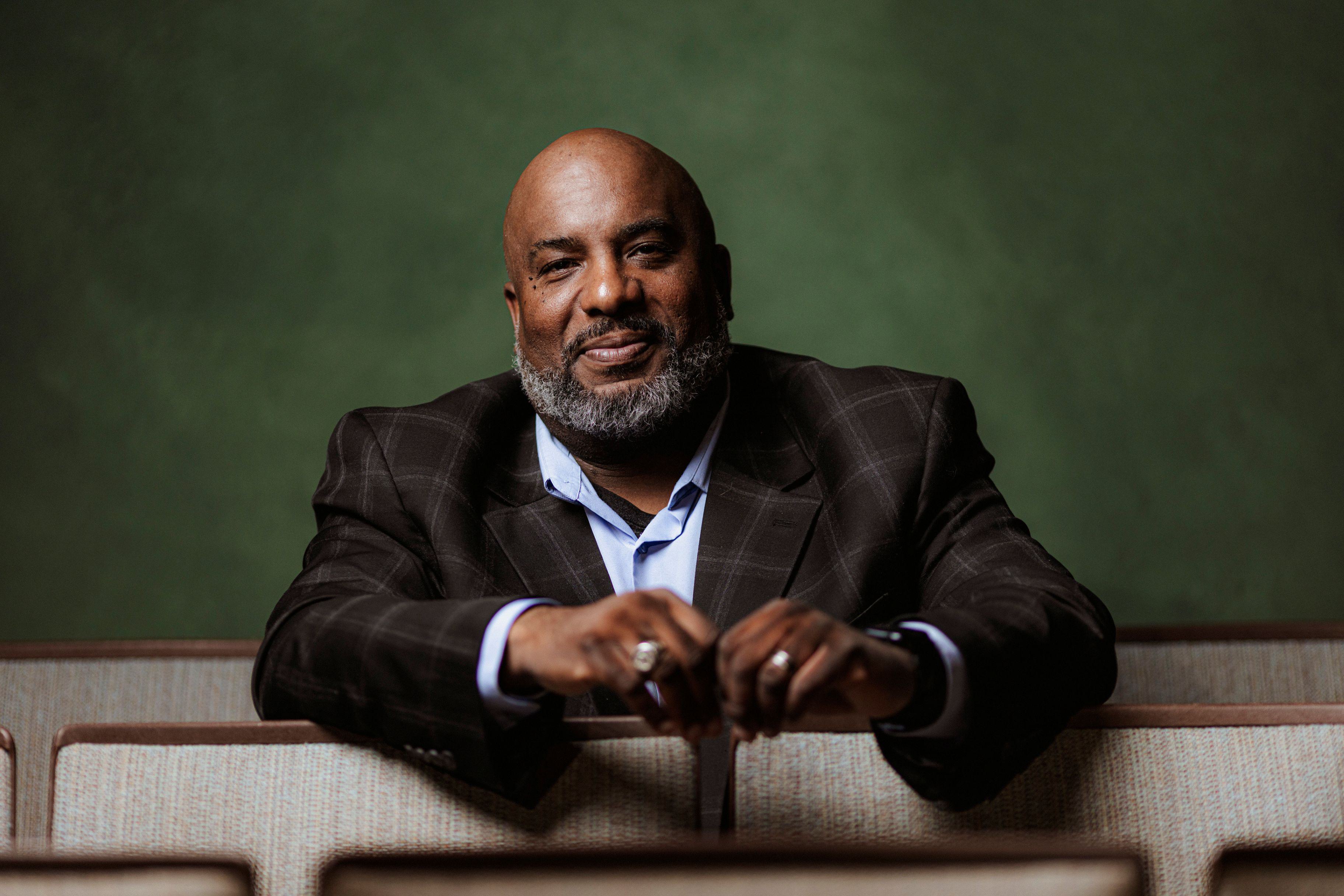W. Jerome Stevenson is leading through a time of transition at ÃÛÌÒÓ°ÏñAV.
Installed on July 1 as the interim dean of the schools of Music and Theatre, Stevenson has taken the reins following the retirement of longtime dean Mark Parker.
Having served as the associate dean of Theatre prior to his appointment as interim dean, Stevenson brings a wealth of experience to the leadership position. This includes more than 25 years of experience as an actor, director, singer, coach, educator and administrator in professional theatre.
To help introduce himself to current and prospective students, Stevenson recently took part in a Q&A covering his philosophy on performing arts education, his expectations for his role and his message to students considering a music or theatre degree at ÃÛÌÒÓ°ÏñAV.
Q: In times of transition, people naturally have questions about continuity. Could you elaborate on some of the ways ÃÛÌÒÓ°ÏñAV will continue to serve as one of the preeminent destinations for music and theatre preparation?
A: Certainly. It’s essential for us to emphasize that, although the familiar faces of the leaders of these two excellent schools have changed, the fundamental philosophies behind that excellence have not. ÃÛÌÒÓ°ÏñAV continues to prioritize excellence in student scholarship and artistry, cultivating the artist within each student rather than forcing them into a predetermined mold. ÃÛÌÒÓ°ÏñAV Performing Arts programs are designed to develop the individual artists who walk through our doors and help them become the skilled and marketable professionals they are driven to be. That’s why our programs combine rigorous course and studio work with a wealth of practical opportunities. In production, performance, and collaboration, we are preparing our students to shine as individuals in an ever-changing professional world.
Q: What are some of your priorities for the schools as you assume this leadership role?
A: Since I arrived at ÃÛÌÒÓ°ÏñAV, I have been impressed by the extraordinary work and experiences in which our students are involved. This may be common knowledge to those within the schools of Music and Theatre, but for many outside our buildings, it has been a well-kept secret. One of my top priorities is to communicate the outstanding work that has been happening inside these walls for years. The caliber of guest artists. The unique top-tier educational experiences – both here and abroad. What our faculty, staff, and students are doing is quite extraordinary, and while I want them to continue focusing on what we’re doing, I’m prioritizing telling those stories – but it's a story worth telling because that’s how we inspire the next slate of ideas.
Along those lines, we are expanding on our commitment to Community Outreach efforts.
The ÃÛÌÒÓ°ÏñAV brand holds great significance in the regional performing arts conversation, but there is still progress to be made in informing local educators, parents, students, and professionals about who we are and what we do, and in welcoming them to be a part of our community. Performing Arts at ÃÛÌÒÓ°ÏñAV is about more than merely developing craft. It’s also about nurturing the servant-leaders who recognize the importance of service in the arts. We are excited about creating even more experiences to serve the diverse communities our faculty, staff, and students represent.
Q: Could you detail some of your philosophy on instruction in performing arts? What are one or two things you feel faculty need to do to help students succeed?
A: The most important asset that any gifted performing artist has is their unique perspective. Only through their unique lens and experiences can they discover the real value and marketability of their work. And in that lies the root of my philosophy on instruction: to help each student who walks through our doors be the best version of themselves. We’re not looking to turn them into another version of someone else. There wasn’t another Kristin Chenoweth or Kelli O’Hara before, and there won’t be another after. We don’t want our students trying to cram themselves into an existing mold; we want them to explode out of the mold to become the singularly gifted artists that only they can be.
To achieve this, the faculty must:
- Provide students with the tools and techniques to master their craft
- Understand who the student is, what their needs are, and strive to help them discover how to apply those tools and techniques to develop their own artistic voice.
It’s not an easy task, but it is what makes our faculty so extraordinary, because that’s what they do. And it’s why our students succeed and why I’ve chosen to be here to serve in this exceptional community.

Q: How do you feel like you can best employ your career and experience in this role?
A: From my role as the Associate Dean for the School of Theatre, I have experienced first-hand the myriad ways that the schools of Music and Theatre collaborate and the potential to expand on that existing synergy. From my background in Nonprofit Arts Administration, I bring sustained relationships in the arts and experience in relationship building to this role which will be useful in developing new prospects of support for our students and faculty. But aside from the administrative piece, I understand the journey that our students are on, because I was one of them. I understand the industry that we’re preparing our students for - an industry that I continue to work in – and that impacts my advocacy and decision-making.
Q: Is there any other message you would want to share with prospective students who are considering ÃÛÌÒÓ°ÏñAV for music or theatre?
A: The most important thing I can do is to remind students that they aren’t meant to come to us fully formed. ÃÛÌÒÓ°ÏñAV is a place where you can and should develop as an artist. That means you don’t come here knowing all the answers. No one ever does. But the mistakes don’t define you. They help shape you. ÃÛÌÒÓ°ÏñAV is looking for the whole artist, mistakes and all, because that’s what makes you unique, and that’s what we’re looking for. And if that’s what you’re looking for, then you belong at ÃÛÌÒÓ°ÏñAV.

